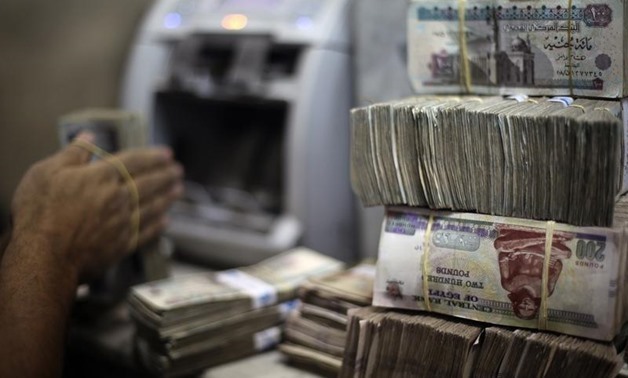
FILE- An employee counts money at an exchange office in downtown Cairo (Photo credit: Reuters/Amr Abdallah Dalsh)
CAIRO - 28 June 2019: Ahmed Shams el-Din, an Egyptian capital markets professional, slammed an argument written earlier in June by Yehia Hamed, finance minister in the government of Mohamed Morsi, ousted Muslim Brotherhood-affiliated president, who claimed that Egyptian economy is collapsing.
Calling the period from 2012 to 2013, during which Hamed was the finance minister in the government of Hesham Qandil, as "Egypt's worst economic crisis since the 1930s" Shams el-Din denied Hamed's claims, saying that Egypt could "cut its current account deficit from more than 5 percent of GDP to less than 2.5 percent—from sustainable income sources (excluding grants)."
The Gross Domestic Product (GDP) measures a country's overall economic activity.
While Hamed claimed that the government's "chronic mismanagement of public finances and overall negligence" has caused external debt to rise significantly, Shams el-Din said that Egypt's external debt has been in fact below the emerging markets average, according to data from the World Bank and CEIC, making it "much more favorable" than Turkey, Malaysia, Chile, South Africa, Morocco, Vietnam, and Mexico.
Concerning deficit, Shams el-Din said that, currently, the deficit is at least 300 basis points lower than the deficit in Hamed's term as minister.
Hamed also claimed that the International Monetary Fund helped the Egyptian government give a wrong "rosy" image about the Egyptian economy through posting exaggerated growth rates for Egypt, with the money borrowed by Egypt included in these rates.
Hamed also blamed the increasing poverty rate on the government and the IMF's policy, saying that "the IMF is asking governments to cut subsidies to deal with economic disequilibrium."
Responding to the aforementioned remarks, Shams el-Din said that the Muslim Brotherhood, during the president's term, was about to sign a deal with representatives of the IMF, which Hamed now criticizes, adding that the Muslim Brotherhood was looking forward to inking the deal with the IMF "in response to what was at the time a bleak economic situation," including severe currency shortage and shortage in energy supplies.
Both Hamed and Shams el-Din managed to get their opinion articles published in the American Foreign Policy magazine in June. However, the magazine inserted its footer noting that "the views expressed in this article are the author’s alone and do not necessarily reflect the views of his current or former employers" only below Shams el-Din's article.
On the other hand, the magazine described the former position of Hamed as former investment minister in Egypt's "last democratically elected government," ignoring the fact that the incumbent president, who is currently serving his second term, took post after general elections were held before each of his two terms. Moreover, both Morsi's Prime Minister Hesham Qandil and President Abdel Fatah al-Sisi's former Prime Minister Sherif Ismail and current Prime Minister Mostafa Madbouli were appointed directly upon presidential decrees, which complies with the Egyptian law.


Comments
Leave a Comment